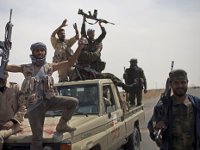Who rules Libya - parliament or police fighters?
On Sunday, the coalition of liberal forces of Libya announced that it won the first parliamentary elections since 1964. "Muslim Brotherhood" has confirmed their loss in Tripoli and Benghazi, where half of the population resides. Yet, how successful the elected parliament will be in Libya ruled not by law, but rather a gang of ex-fighters for independence.

The defeat of the Islamists in Benghazi was unexpected, but understandable because of the nationalism of the Libyans who know that the "brothers" in the Party of Justice are mostly people from neighboring Egypt. Egyptians are generally disliked in Libya because under Gaddafi they occupied the lower level of the social ladder, engaging in the most menial jobs. In addition, the Islamists have gone too far with the imposition of their so-called "independents" (120 of 220 seats in the parliament) during the election campaign on television. After the 42-year dictatorship of the media Libyans are very sensitive to any excess in this area.
The parliamentary election was won by the liberal Union of National Forces that brings together some 50 parties and 78 independent candidates under the banner of "moderate Muslim country, democracy, and separation of the executive and legislative branches of government." The Union is headed by Mahmoud Jibril who came out of the transitional government (PNS) to stand for the parliament. He is a native of the warfalla tribe, the largest in the country, and the one that has been always loyal to Gaddafi but had a number of serious collisions with him. Jibril has joined the revolution from its very inception, and served in the PNS as prime minister.
Two hundred seats in the National Congress will be divided between Tripolitania, the most populated region of the western Libya (102 seats), Cyrenaica (East) and the area of Fezzan (south) with 60 and 40 seats, respectively. The Parliament will choose the prime minister and draft a new constitution. The election on the large area of the country was marked by a high turnout, but in the south of Benghazi several sites have been attacked. This is understandable, since the separatist sentiment is very strong. The victory belongs to moderate Muslims who understand that the main threat comes not from the "Brotherhood" and not even from separatism Cyrenaica, but the gangs of militias, renamed "police".
PNS now has virtually no power in Libya. Thus, the report of the international non-governmental organization Amnesty International published on Thursday describes a fairly bleak picture. The document, drawn up based on the results of the visits to the country in May and June, is entitled "Libya: Rule of law or rule of militia." Of course, the militia (that is, the very "police"), concluded the authors of the report. Human rights activists state that the rebels who fought with the army of Gaddafi refused to lay down their arms and continue to commit atrocities and arbitrary arrests, torture and murder with impunity.
According to AI, the gang kept in captivity about four thousand supporters of Gaddafi and subjected them to torture. The report describes 20 documented cases in which prisoners have died in secret prisons, were tortured with electricity, and battered with metal bars and sticks. The situation is no better with the refugees. For example, 30,000 Tauerga people were expelled from their homes by police from a nearby Misrata and have not been able to come back. This is a tribe of blacks favored by Gaddafi and pursued in Libya, as well as other black Libyans, wrote the authors of the report. The south is also restless. Around the Kufra oasis there is a struggle between black African Tabu tribe and Arab tribe Zvai. Tuba announced their intention to boycott the elections on July 7.
Who are these "police"? Libyans first called them "zowar" - fighters for independence. Among them there are many deserters from the army of Gaddafi and former police officers. These are well-trained military people who do not want to transfer power to the civilian authorities. Organized according to tribal rules, they have turned into a small army with its rigid hierarchy, arsenals, and controlled areas. Even the capital city of Tripoli is divided into zones of influence, not to mention the rural areas.
Amnesty International noted that the Libyan authorities (National Transition Council and the Provisional Government) "do not have the ability or desire to resist the police" under the pretext of "lack of security and a large number of weapons." The language is strange, but understandable if one considers a PNS law that established immunity from prosecution for the rebels who "protect the revolution of the 17th February."
There is a danger that the four decades of rule of Gaddafi in terms of human rights violations will be forgotten and replayed, wrote the authors of the report. However, the West, and particularly France, now controls oil and gas of Libya - the most hydrocarbon-rich country in the region.
Lyuba Lulko
Pravda.Ru
Subscribe to Pravda.Ru Telegram channel, Facebook, RSS!


